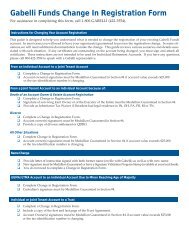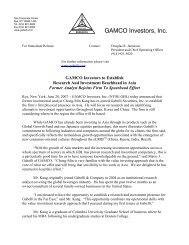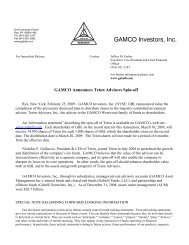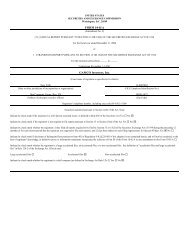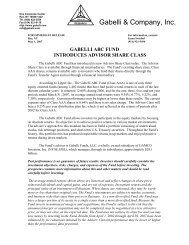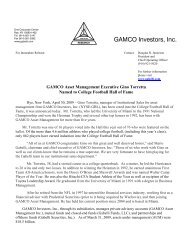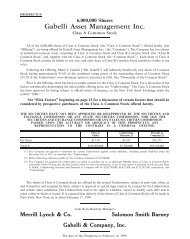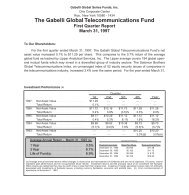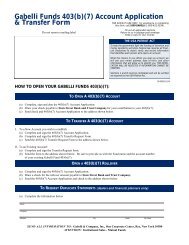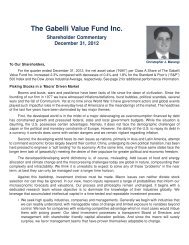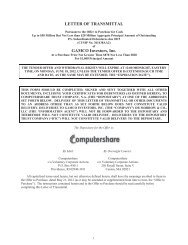Statement of Additional Info - Gabelli
Statement of Additional Info - Gabelli
Statement of Additional Info - Gabelli
Create successful ePaper yourself
Turn your PDF publications into a flip-book with our unique Google optimized e-Paper software.
Mortgage-Related Securities (the Mid-Cap Equity Fund, the Balanced Fund, and the Intermediate Bond Fund).<br />
Mortgage pass-through securities are securities representing interests in "pools" <strong>of</strong> mortgages in which payments <strong>of</strong> both<br />
interest and principal on the securities are made monthly, in effect "passing through" monthly payments made by the<br />
individual borrowers on the residential mortgage loans which underlie the securities (net <strong>of</strong> fees paid to the issuer or<br />
guarantor <strong>of</strong> the securities).<br />
Early repayment <strong>of</strong> principal on mortgage pass-through securities (arising from prepayments <strong>of</strong> principal due to sale <strong>of</strong><br />
the underlying property, refinancing, or foreclosure, net <strong>of</strong> fees and costs which may be incurred) may expose a Fund to a<br />
lower rate <strong>of</strong> return upon reinvestment <strong>of</strong> principal. Also, if a security subject to repayment has been purchased at a<br />
premium, in the event <strong>of</strong> prepayment the value <strong>of</strong> the premium would be lost. Like other fixed-income securities, when<br />
interest rates rise, the value <strong>of</strong> a mortgage-related security generally will decline and generally may also increase the<br />
inherent volatility <strong>of</strong> the mortgage-related security by effectively converting short term debt instruments into long term<br />
debt instruments; however, when interest rates decline, the value <strong>of</strong> mortgage-related securities with prepayment features<br />
may not increase as much as other fixed-income securities. In recognition <strong>of</strong> this prepayment risk to investors, the Public<br />
Securities Association (the "PSA") has standardized the method <strong>of</strong> measuring the rate <strong>of</strong> mortgage loan principal<br />
prepayments. The PSA formula, the Constant Prepayment Rate or other similar models that are standard in the industry<br />
will be used by a Fund in calculating maturity for purposes <strong>of</strong> its investment in mortgage-related securities.<br />
Payment <strong>of</strong> principal and interest on some mortgage pass-through securities (but not the market value <strong>of</strong> the securities<br />
themselves) may be guaranteed by the full faith and credit <strong>of</strong> the U.S. government (in the case <strong>of</strong> securities guaranteed by<br />
GNMA); or guaranteed by agencies or instrumentalities <strong>of</strong> the U.S. government (in the case <strong>of</strong> securities guaranteed by<br />
FNMA or the FHLMC, which are supported only by the discretionary authority <strong>of</strong> the U.S. government to purchase the<br />
agency's obligations). Mortgage pass-through securities created by non-governmental issuers (such as commercial banks,<br />
savings and loan institutions, private mortgage insurance companies, mortgage bankers, and other secondary market<br />
issuers) may be supported by various forms <strong>of</strong> insurance or guarantees, including individual loan, title, pool and hazard<br />
insurance, and letters <strong>of</strong> credit, which may be issued by governmental entities, private insurers, or the mortgage poolers.<br />
Collateralized Mortgage Obligations ("CMOs") are hybrid instruments with characteristics <strong>of</strong> both mortgage-backed<br />
bonds and mortgage pass-through securities. Similar to a bond, interest and prepaid principal on a CMO are paid, in<br />
most cases, monthly. CMOs may be collateralized by whole mortgage loans but are more typically collateralized by<br />
portfolios <strong>of</strong> mortgage pass-through securities guaranteed by GNMA, FHLMC, or FNMA. CMOs are structured into<br />
multiple classes, with each class bearing a different stated maturity and principal payment schedule. To the extent a<br />
particular CMO is issued by an investment company, a Fund's ability to invest in such CMOs will be limited. See<br />
"Investment Restrictions" below.<br />
Other Asset-Backed Securities (the Mid-Cap Equity Fund, the Balanced Fund, and the Intermediate Bond Fund).<br />
Other asset-backed securities (“ABS”) (unrelated to mortgage loans) have been <strong>of</strong>fered to investors, such as Certificates<br />
for Automobile Receivables ("CARS (SM) "). CARS (SM) represent undivided fractional interests in a trust whose assets<br />
consist <strong>of</strong> a pool <strong>of</strong> motor vehicle retail installment sales contracts and security interests in the vehicles securing the<br />
contracts. Payments <strong>of</strong> principal and interest on CARS (SM) are "passed through" monthly to certificate holders and are<br />
guaranteed up to certain amounts and for a certain time period by a letter <strong>of</strong> credit issued by a financial institution<br />
unaffiliated with the trustee or originator <strong>of</strong> the trust or by the existence <strong>of</strong> a subordinated class <strong>of</strong> securities. Underlying<br />
sales contracts are subject to prepayment, which may reduce the overall return to certificate holders. If the letter <strong>of</strong> credit<br />
is exhausted, certificate holders may also experience delays in payment or losses on CARS (SM) if the full amounts due on<br />
underlying sales contracts are not realized by the trust because <strong>of</strong> unanticipated legal or administrative costs <strong>of</strong> enforcing<br />
the contracts, or because <strong>of</strong> depreciation, damage or loss <strong>of</strong> the vehicles securing the contracts, or other factors. For<br />
ABS, the industry standard uses a principal prepayment model, the ABS model, which is similar to the PSA described<br />
previously under "Mortgage-Related Securities." Either the PSA model, the ABS model, or other similar models that are<br />
standard in the industry will be used by a Fund in calculating maturity for purposes <strong>of</strong> its investment in ABS.<br />
Short Sales Against the Box (the Mighty Mites Fund and Mid-Cap Equity Fund). These Funds may sell securities<br />
"short against the box." While a short sale is the sale <strong>of</strong> a security that these Funds do not own, it is "against the box" if at<br />
all times when the short position is open, these Funds own an equal amount <strong>of</strong> securities or securities convertible into, or<br />
exchangeable without further consideration for, securities <strong>of</strong> the same issue as the securities sold short. In a short sale,<br />
the Funds do not immediately deliver the securities sold or receive the proceeds from the sale. Short sales against the box<br />
may be subject to special tax rules, one <strong>of</strong> the effects <strong>of</strong> which may be to accelerate income to the Funds.<br />
17




